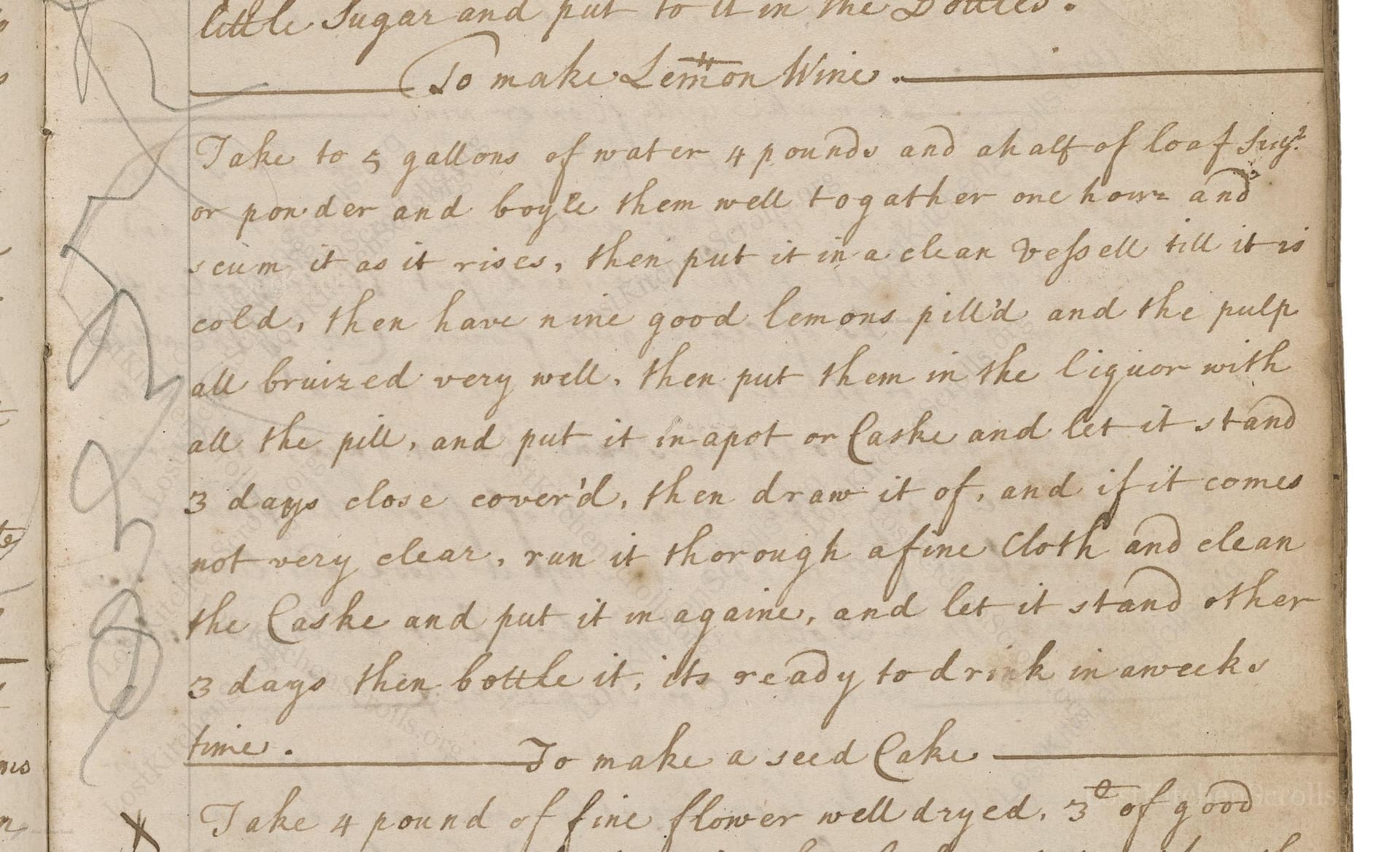To Make Lemon Wine
From the treasured pages of Receipt book of Dorothy Stone
Written by Dorothy Stone

To Make Lemon Wine
"Take 4 gallons of water & 4 pound and a half of loaf Sugar or powder and boyle them well togather one hower and scum it as it rises, then put it in a clean Vessell till it is cold, then have nine good Lemons pilld and the pulp all bruized very well, then put them in the Liquor with all the pill, and put it inapor or Caske and let it stand 3 days close cover'd, then draw it of, and if it comes not very clear, run it thorough a fine Cloth and clean the Caske and put it in againe, and let it stand other 3 days then bottle it, its ready to drink in a week's time."
Note on the Original Text
This recipe is recorded in the loose, flowing prose typical of handwritten domestic manuscripts from the period. Spelling was not standardized—'boyle' for boil, 'scum' for skim, 'pilld' for peeled, 'lucquor' for liquor—reflecting the conventions or regional dialects of the era. Detailed measurements for time and temperature are absent, relying instead on observation and experience. The directions presume familiarity with kitchen equipment and processes, and ingredients like 'loaf sugar' would now be replaced by modern equivalents.

Title
Receipt book of Dorothy Stone (1725)
You can also click the book image above to peruse the original tome
Writer
Dorothy Stone
Era
1725
Publisher
Unknown
Background
Step into the delicious world of early 18th-century kitchens with Dorothy Stone, where classic recipes and culinary curiosities await. Expect a charming medley of hearty fare, sweet treats, and the tasteful secrets of a bygone era.
Kindly made available by
Folger Shakespeare Library
This lemon wine recipe is drawn from the early 18th century, around 1725, and is attributed to Dorothy Stone, a figure representative of the well-educated women who kept family recipe books. At this time, homemade wines—essentially light fermented fruit drinks—were extremely popular in Britain. Lemons were considered exotic yet increasingly available due to expanding trade, and such recipes demonstrate both their desirability and the growing creativity of home cooks of the period. The recipe reflects the domestic ingenuity and curiosity of the early modern English household, where food preservation and fermentation were foundational kitchen skills.

Back in the early 1700s, this recipe would have required a large copper or iron kettle for boiling water and sugar. The lemon pulp was likely bruised in a wooden or ceramic mortar and pestle. Clean earthenware or wooden vessels would have served for cooling and fermenting, sealed with cloth or fitted lids. A fine muslin or linen cloth served as a strainer, and the wine was stored in glass bottles sealed with cork once finished.
Prep Time
20 mins
Cook Time
1 hr
Servings
30
We've done our best to adapt this historical recipe for modern kitchens, but some details may still need refinement. We warmly welcome feedback from fellow cooks and culinary historians — your insights support the entire community!
Ingredients
- 4 gallons water
- 4.4 lbs white sugar (granulated or powdered; substitute for loaf sugar)
- 9 large lemons
Instructions
- Begin by boiling 4 gallons of water with 4.4 pounds of white granulated sugar (loaf sugar or powdered sugar in the original) for about one hour, skimming any froth that forms on top—this would have clarified the liquid.
- Allow the mixture to cool down completely in a clean vessel.
- Next, take 9 large lemons, peel them, and thoroughly bruise or mash the pulp.
- Add both the peels and crushed pulp into the cooled sugar water.
- Pour the entire mixture into a fermentation vessel or a large glass jar/cask, cover it, and allow it to stand undisturbed for three days at room temperature.
- After three days, carefully decant the liquid, filtering it through a fine cloth if it’s not clear.
- Clean the vessel, return the liquid, and let it stand a further three days.
- After this, bottle the lemon wine.
- It will be drinkable within a week, but further aging will improve flavor.
Estimated Calories
210 per serving
Cooking Estimates
It takes about an hour to boil the sugar and water, and around 20 minutes to prepare the lemons. The recipe makes about 15 liters of lemon wine, which you can easily divide into about 30 servings (500 ml each). Each serving contains roughly 210 calories, mainly from the sugar.
As noted above, we have made our best effort to translate and adapt this historical recipe for modern kitchens, taking into account ingredients nowadays, cooking techniques, measurements, and so on. However, historical recipes often contain assumptions that require interpretation.
We'd love for anyone to help improve these adaptations. Community contributions are highly welcome. If you have suggestions, corrections, or cooking tips based on your experience with this recipe, please share them below.
Join the Discussion
Rate This Recipe
Dietary Preference
Main Ingredients
Culinary Technique
Occasions

Den Bockfisch In Einer Fleisch Suppen Zu Kochen
This recipe hails from a German manuscript cookbook compiled in 1696, a time whe...

Die Grieß Nudlen Zumachen
This recipe comes from a rather mysterious manuscript cookbook, penned anonymous...

Ein Boudain
This recipe comes from an anonymous German-language manuscript cookbook from 169...

Ein Gesaltzen Citroni
This recipe, dating from 1696, comes from an extensive anonymous German cookbook...
Browse our complete collection of time-honored recipes



